I'm A Remote Work Expert, And My Followers Keep Telling Me About These Wild Job Scams
I’ve been working remotely in both hybrid and fully remote roles in tech for the last 11 years.
Giphy / Via giphy.com
In addition to my experience in tech as a remote worker, I run a fully virtual business that helps neurodivergent and LGBTQ+ folks get their money right, find jobs, start businesses, pivot to a remote work lifestyle, and design their ideal lives. I've also been writing about work and money for the last five years on my blog and as a freelancer writer.
During the last couple of years, the pandemic brought forward an abrupt move to remote work for some sectors. Because of it, you no longer have to work in tech or a similar field to get a remote job. Remote work is becoming more normalized than ever before.
With the rise of remote work, comes the rise of remote job scams. And OOF, are they annoying.
Remote job scams have been happening so much that many folks don’t want to continue their remote job search. The FBI investigated several of these scams, and since 2019, found that the average reported loss from these scams was $3,000 per victim.
When people first find me or my content online, some ask if applying to remote jobs is even worth it because they are so sick of seeing scams. I get it. How are they expected to perform a successful job search when 80% of it's filled with scams?
In America, we are met with scams at every turn, every single day.
It’s time we expose it all and talk about ways you can avoid these predatory scams altogether.
The Most Common Remote Job Scams
CBC / Via giphy.com
There are dozens of different types of remote job scams that come in all different shapes and sizes.
I scroll through hundreds of remote job listings a day to share with my audience and clients to aid in their remote job search, and what I find is not pretty.
They usually contain what you would normally expect from a job scam. The job description seems off with a lot of typos, grammatical errors, over-punctuation, and inappropriate usage of CAPS. There is a sense of urgency with little information about what you’ll actually be doing in the job. And they sound too good to be true with verbiage like “unlimited earning potential.”
Instead of sharing a random collection of remote job scams I found on my own, I think first-hand accounts from my own followers and readers online would be much more helpful.
Imposter Scams
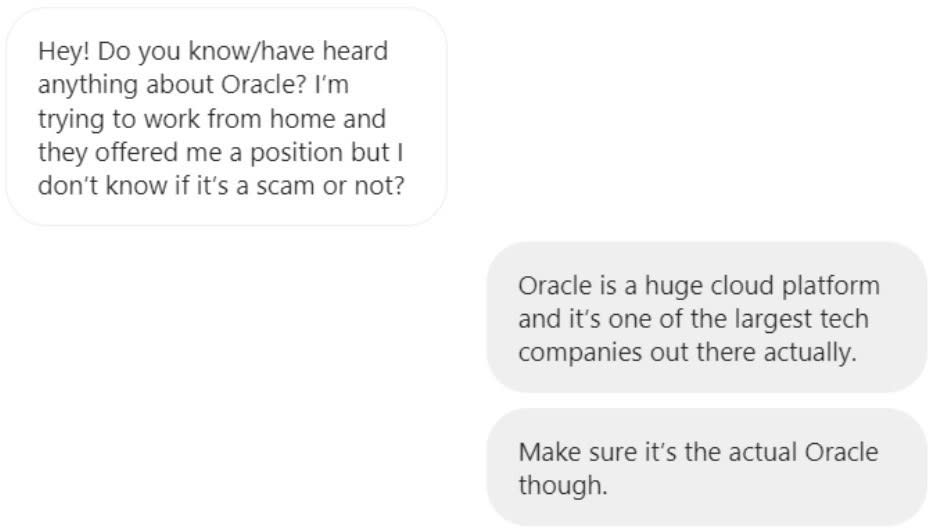
I often share career tips on my Instagram and how to pivot to a remote work situation on my platform I Like to Dabble. One day, one of my followers, Danielle, reached out about a remote job she found on Facebook that she suspected was a scam.
A common online remote job scam is when scammers pretend to be a reputable company like Oracle. They’ll use people’s names at the company that they find on LinkedIn, then try to message you about the “job” as those people. So, when you search for them on LinkedIn to check if they are there, they seem legit. They’ll even spoof email addresses to make it seem like they work at the real company. But they’re complete imposters.
If they only converse with you on messaging apps and avoid emailing you, it’s probably a scam.
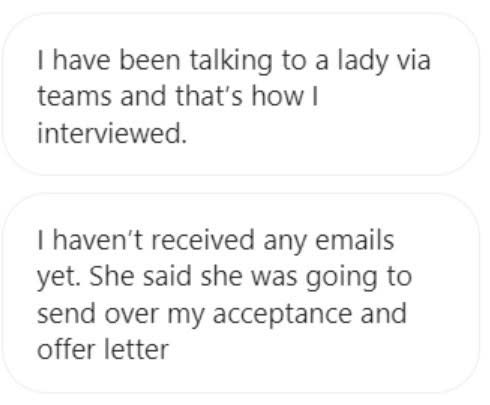
All conversations about a new job will usually be via phone or email, and would never occur in a messaging platform alone.
Then, the alarms went off. She finally got verification this was for sure a scam when they asked her to deposit a fishy looking check.
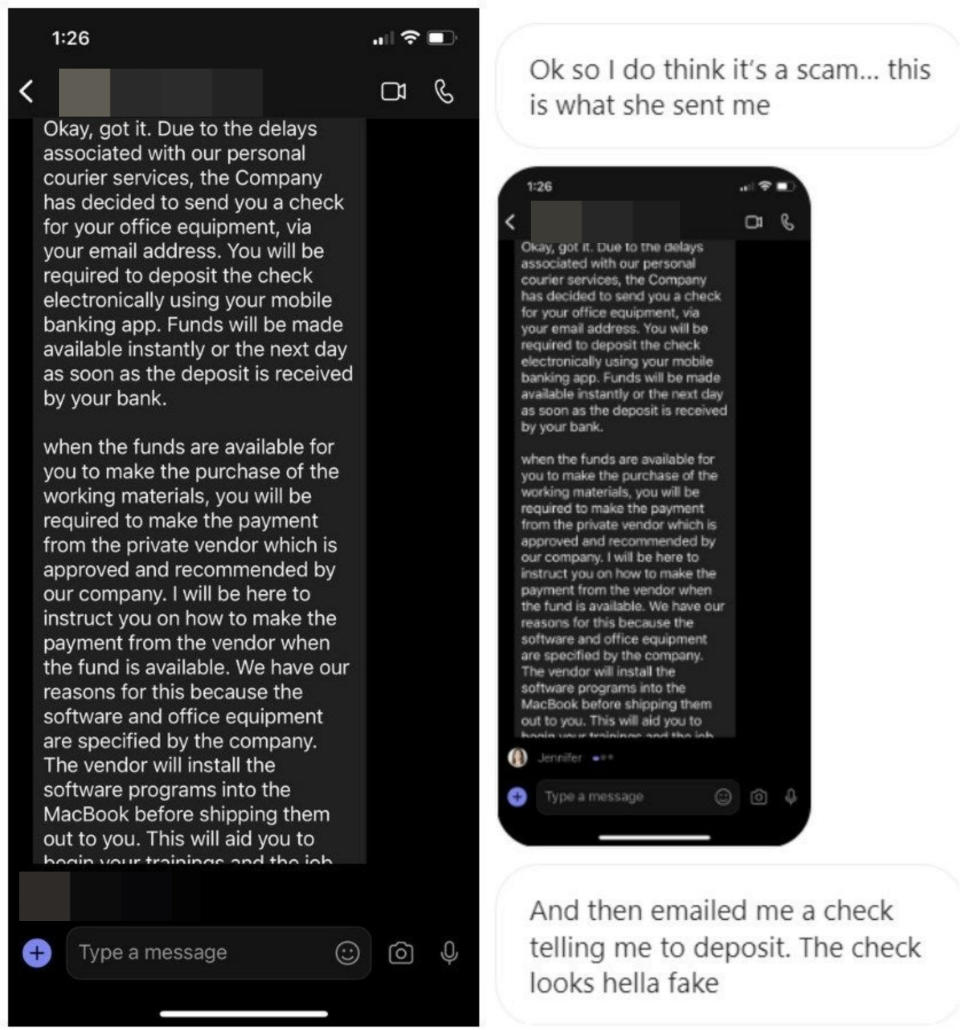
This is the MOST crimson red flag of all the possible red flags. If they ask you to deposit a check for payment for working materials, it's absolutely a scam. A common word for this type of scam is "jobfishing." Jobfishing is when a scammer "fishes" for financial information through a job scam.
A reputable company doesn’t go through a complicated check process like this to provide you home office equipment. If they provide equipment, they already have it in stock to mail it to you. If they cover a reimbursement or stipend for home office equipment, they will include that in your benefits or paycheck to cover that.
Scams Can Even Be Found on LinkedIn
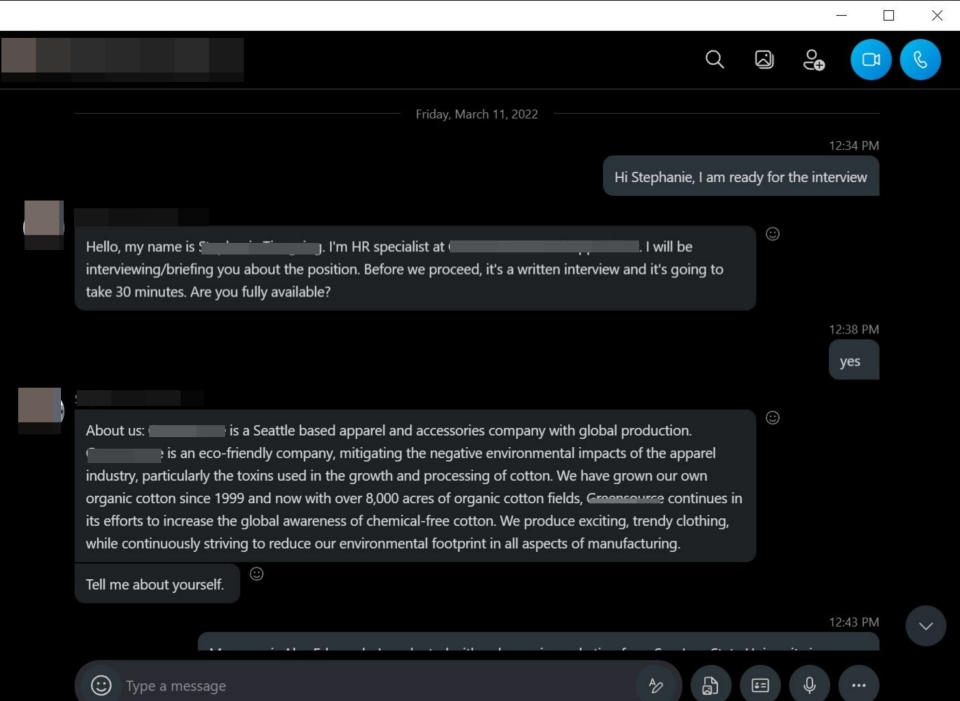
The same sort of text-only conversation tactics from remote job scams have started to make their rounds on LinkedIn, too. This is exactly what happened with Alex Edmonds from the Building an Indie Business podcast after applying to a remote job on LinkedIn. “I never interacted with anyone face-to-face, only text,” Alex said. The interview was also text-only.
After the text-only interview, Alex received a very real-looking offer letter to sign.
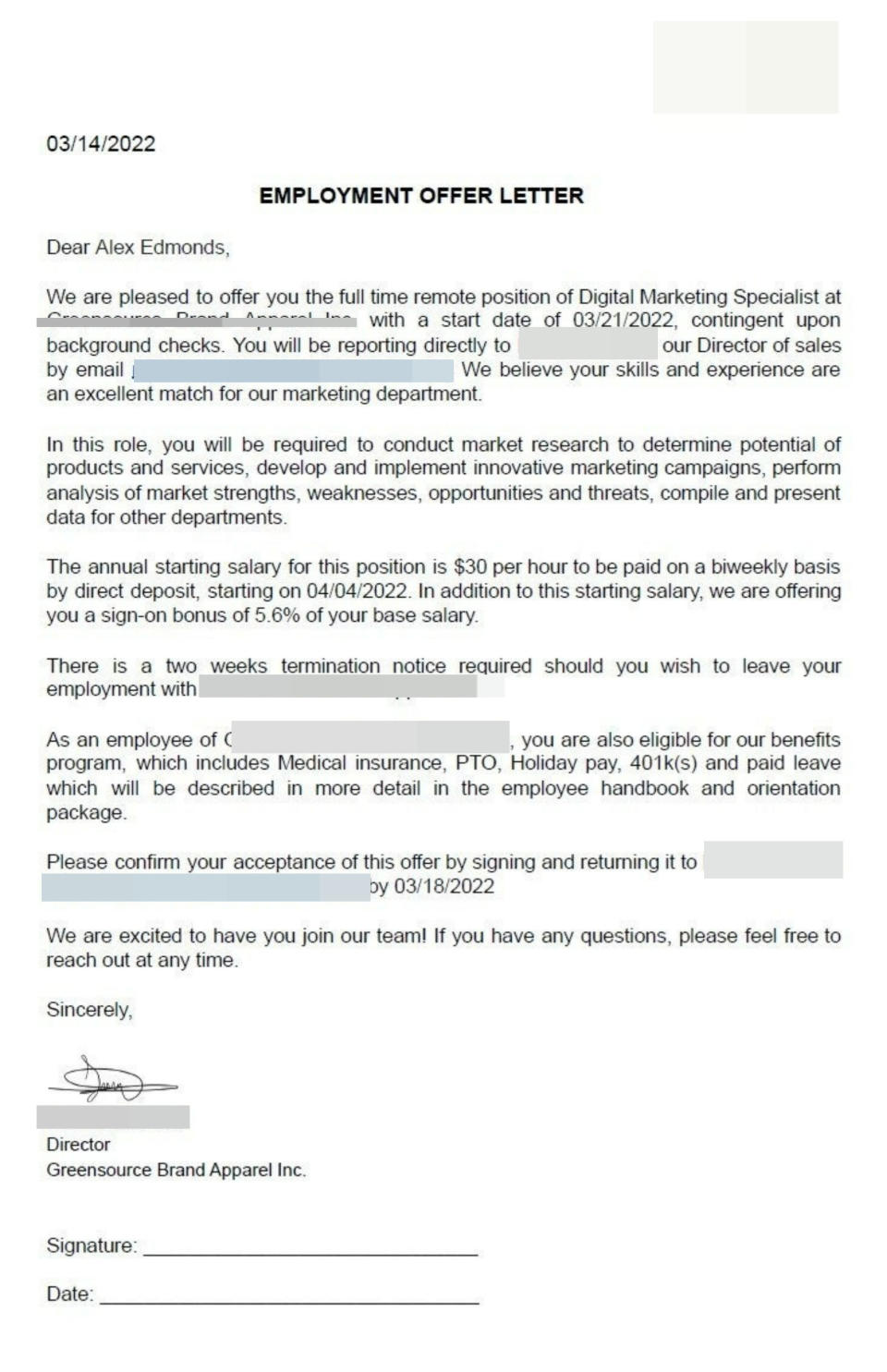
He said the company even has a page set up to look like they’re a legitimate company on LinkedIn. LinkedIn currently has no way of verifying companies that are added to the platform and does not hand scan their platform for scams.
Data Entry Job Scams on LinkedIn
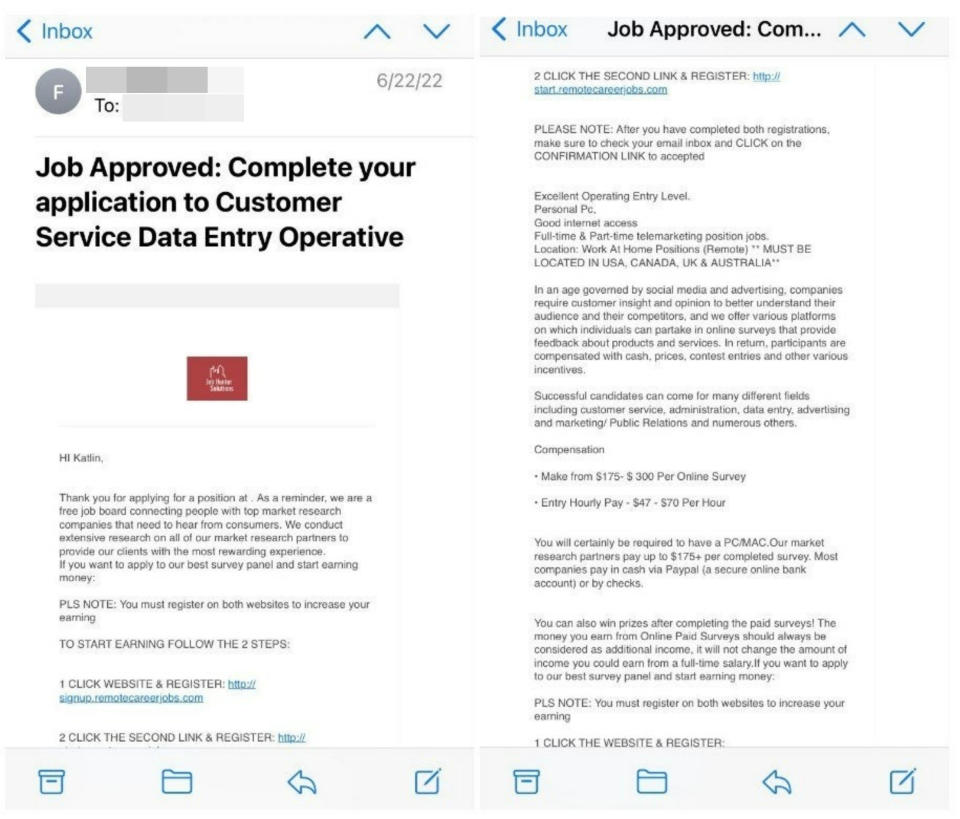
Katlin Moore applied to a data entry job on LinkedIn, then was emailed details to register on some third-party company website to take surveys. A legitimate data entry job will never ask you to register on a third-party website to take surveys. Taking online surveys isn't even a legitimate job, nor do they make enough to classify as a legit side hustle. I have yet to see any online surveys pay up to $300 per survey like her email screenshot indicated.
This is another common scam to watch out for.
Remote job scams are making their rounds on AngelList and Indeed, too. And those aren't the only ones, either.
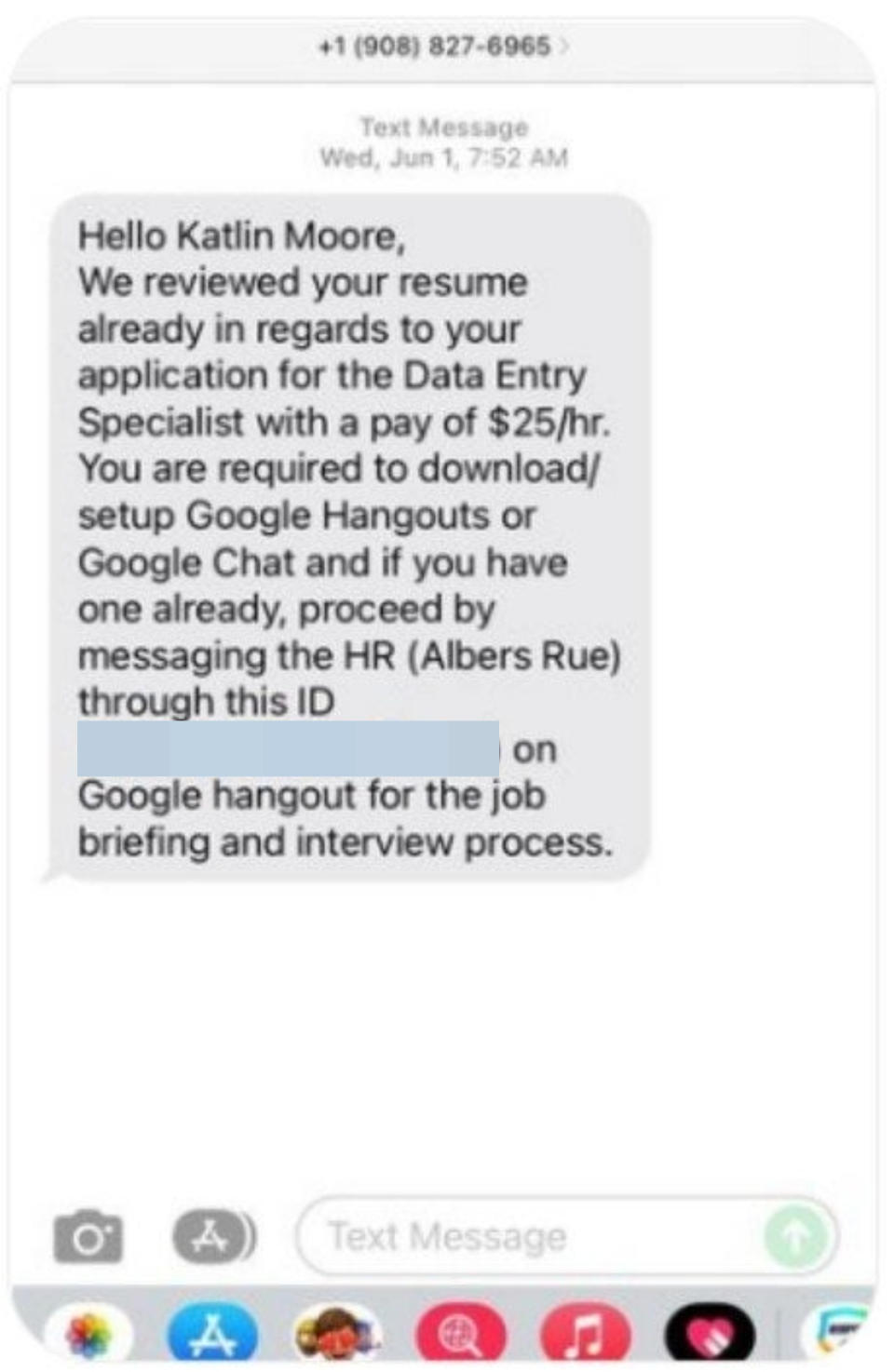
I’ve found in my research that any job boards that don’t charge the employer for job listings will most likely be infested with job scams. If the job board doesn’t at least hand scan them or charge for listing the job, it opens up for more predatory scams to exist.
That’s what Katlin also found when she shared with me two more scams going around: one on AngelList and one on Indeed. Again, we see this same trend of job scammers only reaching out via text and wanting to continue the conversation on a messaging app instead of emails and setting up a time for a formal interview process. This way, they can avoid having to use email addresses that might give up their cover.
However, in this example, I don't understand why they tried to keep it to only texting when they mentioned a gmail email address for the Google Hangout session. Anytime you see a gmail or hotmail email address being used, it most likely is a scam. Real remote jobs will use professional emails that use the company's domain name.
Text messaging is not a part of any legitimate hiring process. At least, not on it's own.
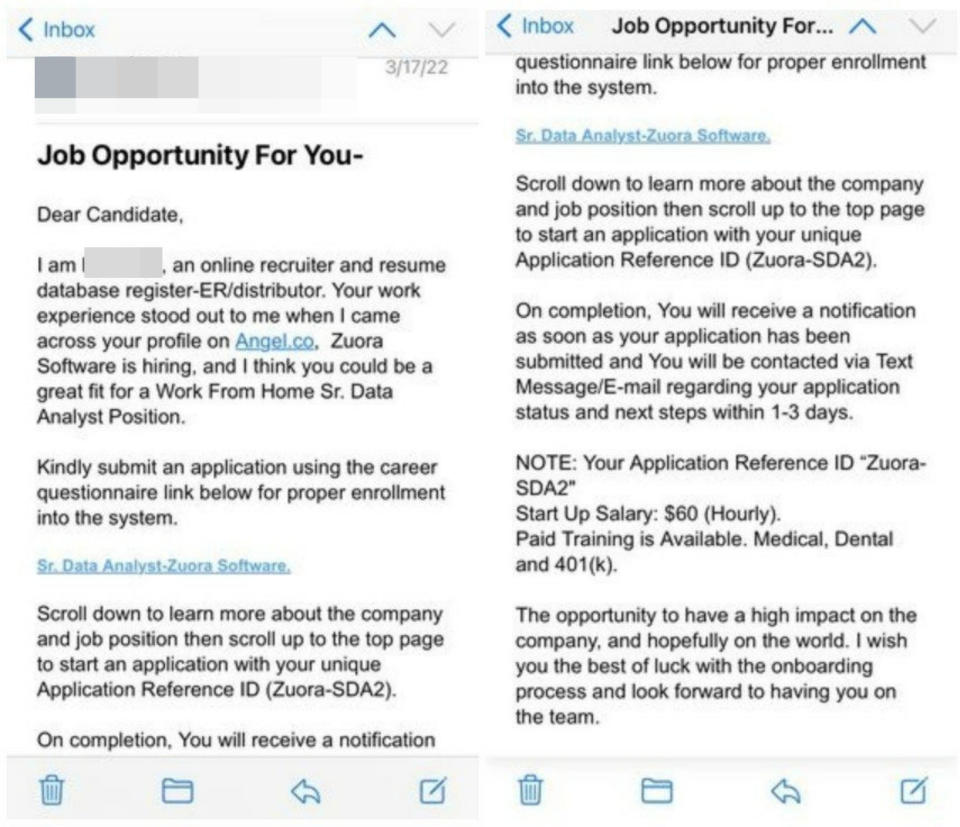
This is a job that Katlin got emailed about from AngelList where we see again that they reference text messaging as a form of communication to expect for the hiring process. This is not the standard way that companies converse with their potential hires, at least not on it's own. You should expect to get formal emails from them with a professional email address using the company's domain name.
Always double check the company's website to see if the job listing exists there, too (and if they have any callouts for recent scams to watch out for that have been using the company's name).
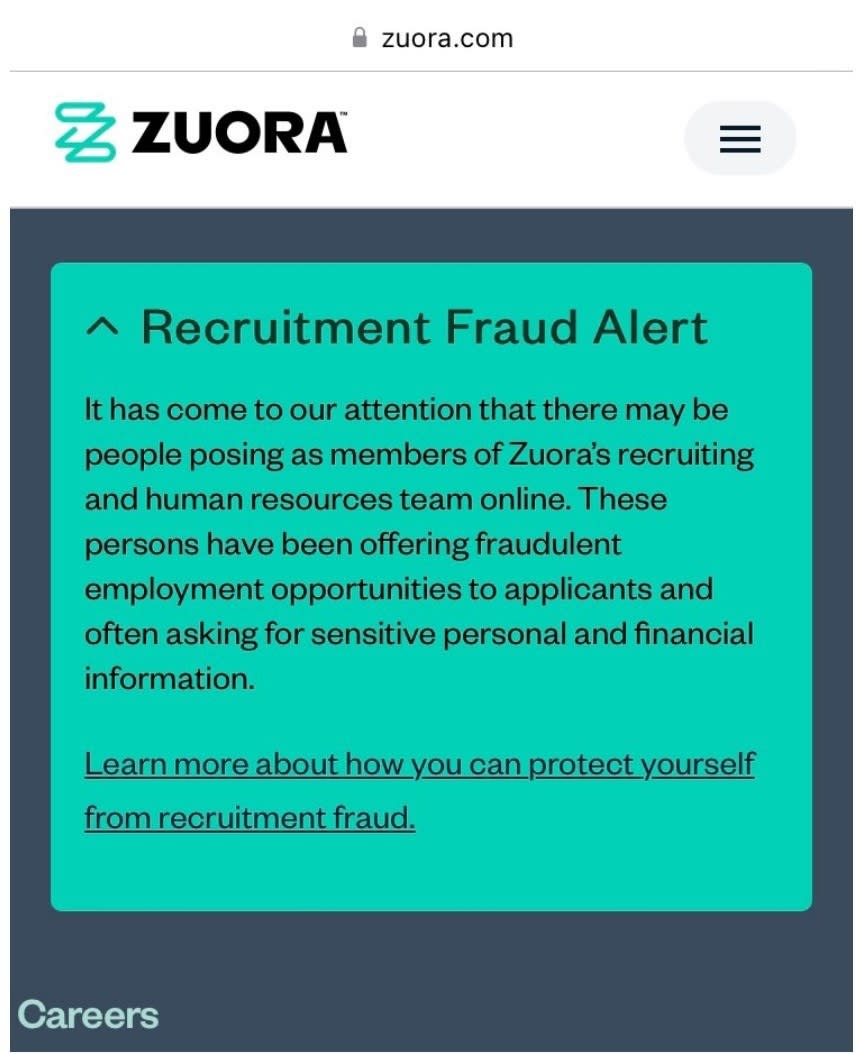
Thankfully, Katlin went directly to the company’s website to make sure the offer was legit.
Double checking the company website to make sure the job listing is real and exists there should be an absolute MUST on your job search checklist for any job you apply for. I also recommend when applying for jobs, to do so directly on the company website to avoid conversing with an imposter scammer.
Multi-Level Marketing Companies Marketing Themselves as Remote Jobs

Multi-Level Marketing schemes (MLMs) are companies that hire what they call “consultants” to sell their products. However, the majority of the money these companies make are from their consultants who have to pay for things like starter kits and the people they recruit for their “downline” who also pay into the company. If you’re thinking “that sounds like a pyramid scheme,” you’re right. They operate eerily similar to pyramid schemes
The FTC classifies these companies as especially risky opportunities with 99% of MLM members losing money. As a “consultant,” you don’t actually work for them. You’re a contractor for them, but you don’t get paid unless you sell something or recruit someone. To me, that isn’t a job, and when they try to market their “consultant openings” as legit “remote Christmas staff,” that’s a huge red flag as another remote job scam.
Employment Centers Are Even Getting Scammed
The Office on Peacock / Via giphy.com
Remote job scams are not only happening to Americans in online job boards. They are happening to employment and recruitment centers across the world.
I spoke with Amanda who works for an Employment Ontario agency in northern Ontario, Canada and runs the career and finance blog My Life I Guess. She expressed that there has been a few job scams that even fooled her.
“In one instance, the job posting looked real. They had a thorough and well-written job description, used a local company's name, and used all of their proper contact information — except one. They used a fake email address under 'how to apply,' which was one letter different from the company's real email,” she said. “A client applied for the role and received a response with completely different contact information, including a phone number from another country. After a few messages back and forth, the company asked him to deposit a check into his account, and he knew it was a scam and let us know. But it fooled all of us.”
Why Remote Job Scams Are on the Rise & How You Can Avoid Them 100%
Giphy / Via giphy.com
With the rise of remote job scams, people aren’t seeing those same types of scams for local in-office positions. “We've had hundreds of fraudulent remote job postings submitted to our job bank, but only one that was for a local, in-office role,” Amanda expressed as we talked about why these scams might be on the rise and how to watch out for them.
“Job scams are on the rise because it's easy. The traditional hiring process where a job seeker attends an interview in person at the worksite and meets several staff members is less common. With more of the process being done online, especially for remote jobs, it's much easier to pull off a scam,” said Amanda.
“If you are actively job-seeking, you are putting your personal information out there on LinkedIn, Indeed, and other job boards and networking sites, which scammers can easily access. You are likely applying to dozens of different jobs every week, which can be hard to keep track of. It's very easy to confuse a legitimate job that you directly applied to versus getting an unsolicited offer that is likely a scam.”
When in doubt...
NBC / Via giphy.com
The best way to avoid remote job scams is to always check the company’s website, navigate to the careers page, which you can find in the menu or footer, and check that the job listing is there, too. Then, apply directly on the company website.
The scammers won’t find you there.

